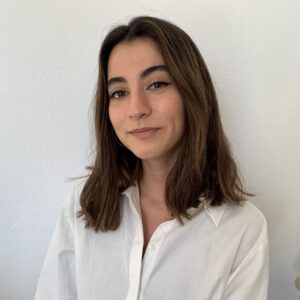Marina_LongBio
 Marina Jiménez
Marina Jiménez
ESR 6 – Mesenchymal stromal cells as key orchestrators in RA.
Marina was born in the sunny city of Alicante in Spain. A few years before graduating from high school, she already knew that she wanted to study something related to biology. But after spending a few months in Paris where she first started her bachelor’s studies in “Sciences de la vie” at Université Paris Diderot (France), she realized that what she was really passionate about was biotechnology. Four years later, she obtained her bachelor’s degree in Biotechnology at Universidad Miguel Hernández de Elche in Alicante, Spain.
During this period, she had her first contact with a real research project in her internship about the asymmetric division of developing neural stem cells and tumorigenesis at the Neuroscience Institute for the Spanish National Research Council (CSIC) in July 2017. Nevertheless, her stay during the 4th BSc year at the Bioengineering Institute of Universidad Miguel Hernández de Elche (July 2018 – July 2019) made the difference in her experimental skills. There, she had the opportunity to develop her project for the study of a nanoparticle as a potential non-viral vector for gene therapy, and ended up mastering numerous techniques such as passaging and transfection of cell cultures, microplate assays for cell viability, flow cytometry analysis, cryostat handling and other histological techniques together with immunohistochemistry and biological image processing. Both internships had in common that they awakened her interest in the medical application of biotechnology.
Thus, to consolidate her knowledge in biomedical research and knowing that she wanted to become a researcher in this area, she opted to study a master’s degree in Biomedicine at Universidad de Barcelona in 2020. There, she spent 6 months developing her master’s final project at the Institute of Biomedical Research of Barcelona (IIBB-CSIC), carrying out the assessment of the hypoxia-induced inflammasome activation in Alzheimer’s cellular models. She was able to learn how to work with a hypoxic chamber and to carry out new procedures such as Western Blot, ELISA, Selfie-RT-PCR, pharmacological and gene-silencing strategies together with b-amyloid peptide treatments among others.
Additionally, during her 3th BSc year she was awarded a Spanish university scholarship “SICUE” that allowed her to spend one year in Barcelona (Spain) finishing her studies, and together with her stay in Paris and her MSc period, it was an experience that gave her the opportunity to value the interpersonal benefit of moving out to a new place, being able to meet new people from different cultures and establishing new relationships. Thus, the ARCAID project seemed the perfect option to strengthen her current knowledge and provide new perspectives while she personally grows in the city of Amsterdam!